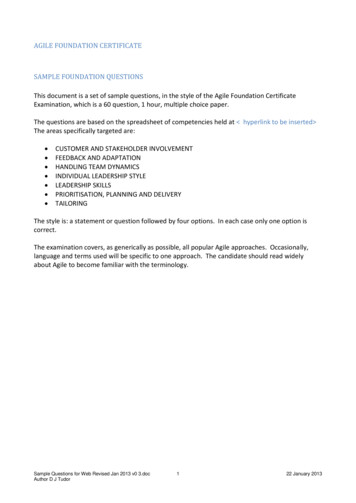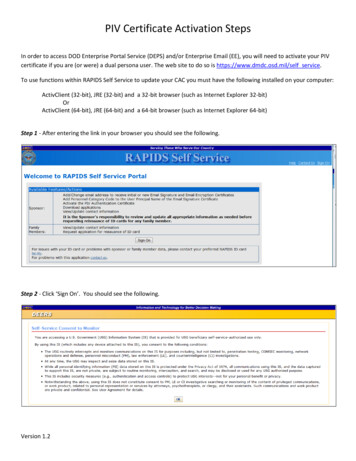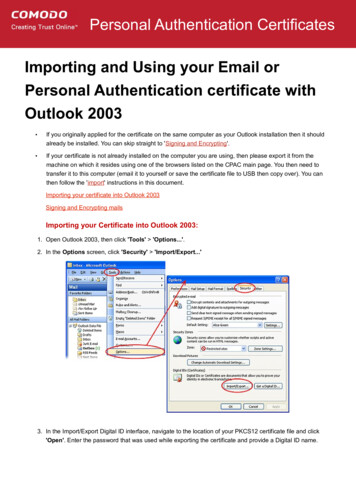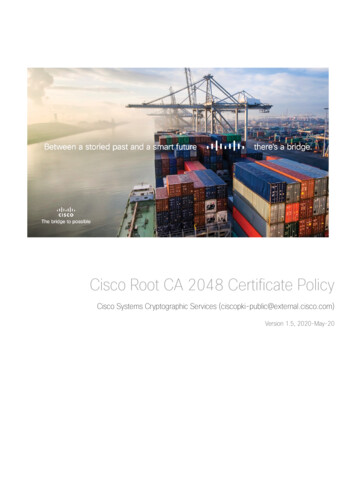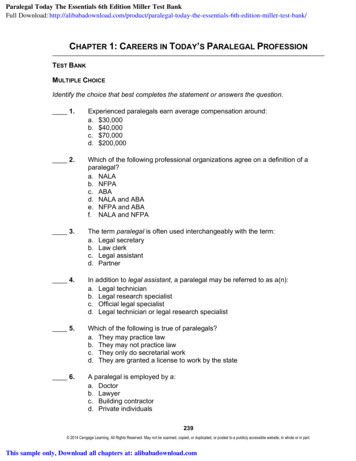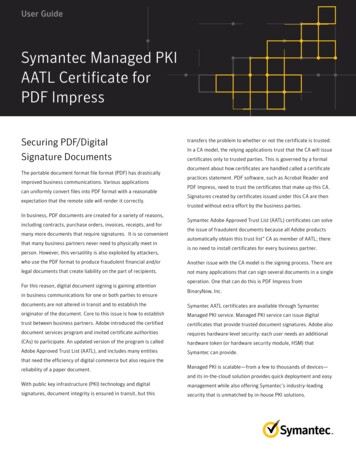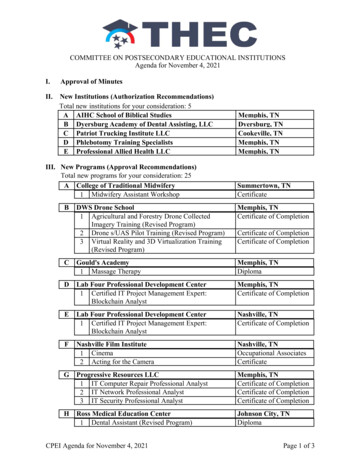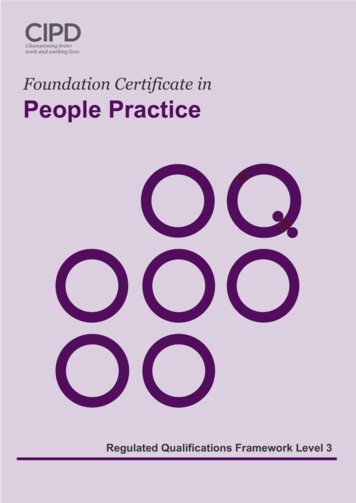
Transcription
Foundation Certificate inPeople PracticeRegulated Qualifications Framework Level 3
ContentsIntroduction . 2Regulated Qualifications Framework (RQF) . 3Qualification size. 3Qualification level. 3Qualification information . 5Link to Apprenticeship . 5Qualification purpose . 5Qualification objective . 5Qualification structure and rules of combination (ROC) . 5Entry guidance . 6Recognition of prior learning (RPL) and exemptions . 7Assessment . 7Progression. 7Compliance . 8Unit content . 93CO01 Business, culture and change in context . 103CO02 Principles of analytics . 153CO03 Core behaviours for people professionals . 193CO04 Essentials of people practice . 23Appendix . 32Appendix A – Alignment to the Profession Map . 33Appendix B – Exemption mapping. 35Appendix C – Apprenticeship mapping. 36Summary of Changes . 38CIPD Foundation Certificate in People Practice1
IntroductionThe CIPD Level 3 Certificate in People Practice is a Foundation-level, professional qualificationbased on the CIPD Profession Map. The Map was launched in 2018, having been developed incollaboration with a wide range of experts working at the heart of the profession. It sets theinternational benchmark for the people profession and provides a strong foundation to give peopleprofessionals the confidence and capabilities to guide their decision-making, actions andbehaviours.Each unit within the CIPD Level 3 Foundation Certificate in People Practice has clear linkage to theProfession Map, as shown in Appendix A.This qualification specification contains what you need to know about the structure, assessmentapproach and delivery content for the CIPD Level 3 Foundation Certificate in People Practice. Thisspecification should be used to inform your planning, delivery and assessment in combination withthe CIPD centre guidance documents.2CIPD Foundation Certificate in People Practice
Regulated Qualifications Framework (RQF)The UK’s Regulated Qualifications Framework (RQF) categorises qualifications in England basedon their size, and their level of challenge or difficulty.The CIPD Level 3 Foundation Certificate in People Practice is on the RQF framework, which isregulated by Ofqual and the Council for the Curriculum, Examinations & Assessment (CCEA) and ison the CQFW framework, which is regulated by Qualifications Wales. The qualification numbers forthis qualification are 603/5958/4 for the RQF and C00/4145/2 for the CQFW.Qualification sizeThe size of a qualification is expressed in hours. This is known as the Total Qualification Time(TQT). The TQT is the total number of hours it is estimated that an average learner will take tocomplete a qualification. For each unit we refer to this as Total Unit Time (TUT).The TQT is made up of the following: Guided Learning Hours (GLH) – this is the time spent by a learner being taught or instructedunder the immediate supervision of a lecturer, supervisor or tutor. The learning must beundertaken in real time with the simultaneous physical presence of the learner and thatperson, or remotely by means of simultaneous online or telephone communication. Additional time taken by a learner in preparation, study, or any other form of participation ineducation or training but not under the immediate supervision of a lecturer, supervisor ortutor.The minimum GLH for this qualification is estimated at 120 hours and the TQTis estimated at 240 hours.The qualification and units equate to a credit value of 24, which is one-tenth of the TQT.Qualification levelThe level of a qualification is determined by looking at the RQF’s range of level descriptors andidentifying the descriptor that provides the best match to the intended knowledge and skillsoutcomes for that qualification.The level descriptors are divided into two categories: knowledge and understanding skills.The descriptors set out the generic knowledge and skills associated with the typical holder of aqualification at that level.CIPD Foundation Certificate in People Practice3
Level 3RQF descriptors for Level 3At Level 3 a learner: has factual, procedural and theoretical knowledge and understanding of a subject or field ofwork to complete tasks and address problems that, while well defined, may be complex andnon-routine can interpret and evaluate relevant information and ideas is aware of the nature of the area of study or work is aware of different perspectives or approaches within the area of study or work can identify, select and use appropriate cognitive and practical skills, methods andprocedures to address problems that, while well defined, may be complex and non-routine can use appropriate investigation to inform actions can review how effective methods and actions have been.Level comparisonThe level of this qualification is comparable to:4 Level 5 in Ireland (NFQ IE) Level 6 in Scotland (SCQF) Level 4 European Qualifications Framework (EQF).CIPD Foundation Certificate in People Practice
Qualification informationLink to ApprenticeshipThis specification has been mapped to the knowledge elements of the L3 HR SupportApprenticeship and the L3 L&D Practitioner Apprenticeship. Please refer to Appendix C for detailsof this mapping.Qualification purposeThe primary purpose of this qualification is to develop learners’ knowledge and skills to build theirexpertise, inspiring them to undertake tactical tasks that deliver value. Learners will build theirconfidence and knowledge aimed at being able to contribute to immediate colleagues, customersand the organisation; supporting change and driving impact, to create immediate and short-termvalue. They will gather information to use in their role and use this to understand their work,organisation and profession more deeply.This can then be applied to the world of work as well as being used as a vehicle to start theirjourney to CIPD membership at the appropriate level to complement career and professionaldevelopment.Qualification objectiveThis qualification introduces the learner to a wide range of relevant knowledge and expertise inpeople practice. It is suited to those learners who: are studying, aspiring to, or embarking on, a career in people practice are working in a people practice support role and wish to develop their knowledge anddeliver immediate and short-term value for their organisation wish to develop the specialist knowledge, skills and understanding required to be a peopleprofessional.Qualification structure and rules of combination (ROC)Qualification structureQualification titleCIPD Level 3 Foundation Certificate in PeoplePracticeQualification numberQN 603/5958/4RQF levelLevel 3Total qualification time240 TQTGuided learning hours120 GLHCIPD Foundation Certificate in People Practice5
Total credit value24 creditsRules of combinationTo be awarded the CIPD Level 3 Foundation Certificate in People Practice, learners are required tosuccessfully complete all four mandatory core units.Core unitsRefUnit title3CO01RQFCreditTUTGLHBusiness, culture and change in context3550253CO02Principles of analytics3440203CO03Core behaviours for people professionals3440203CO04Essentials of people practice31111055Entry guidanceThis qualification is designed for learners aged 16 who want to learn about people practice.Although there are no formal entry requirements, it is expected that centres conduct their owndiagnostics to ensure that this qualification is appropriate for the learner. This should include makingsure that learners can meet the requirements of the learning outcomes and can access theappropriate literacy and numeracy needed to complete the CIPD Level 3 Foundation Certificate inPeople Practice.The CIPD has a policy for students where English is not their first language that gives guidance onappropriate English language entry requirements. The policy can be found on the CIPD qualification-policies.6CIPD Foundation Certificate in People Practice
Recognition of prior learning (RPL) and exemptionsRecognition of prior learning (RPL) is a method of assessment that considers whether a learner candemonstrate that they can meet the assessment requirements for a unit through knowledge,understanding or skills that they already possess and do not need to develop through a course oflearning.For learners who have completed units from a previous CIPD qualification, there are transferopportunities to this qualification that have been predetermined by the CIPD as plannedexemptions. Details of these are listed in Appendix B – Exemption mapping. Non-CIPDqualifications may also be included in this list as appropriate.For learners who have completed units from non-CIPD qualifications that they deem will map tounits of this qualification, they may submit an application form accompanied by clear mapping andevidence of achievement to the CIPD for verification. This will be subject to appropriate fees andlimited to exemptions against 50% of the CIPD qualifications as a maximum.AssessmentAssessment is the process of evaluating an individual’s attainment of knowledge, understandingand skills. The CIPD will set assignments for all core units. Centres will be required to mark theassignments and internally moderate the marks. The CIPD will conduct moderation sampling andvalidate centre marking before the release of results to learners.Assessment focusAssessment for the CIPD Level 3 Foundation Certificate in People Practice is employer-driven andaimed at real scenarios that learners may encounter in their future career.Assessment gradingThis qualification is not graded. Learners will receive either a Pass or Fail. All assessment criteriamust be met in order to achieve a Pass.Qualification achievementAll assessments for this qualification are criterion referenced, based on the achievement of specifiedlearning outcomes.To achieve a Pass for this qualification, a learner must have satisfied all the assessment criteria foreach core unit. If the complete qualification is not achieved, credit can be issued in the form of astatement of standalone unit credit.Statements of standalone unit credit will be subject to the currency of the existing qualification andCIPD quality assurance checks. The CIPD’s decision will be final.ProgressionSuccessful achievement of the CIPD Level 3 Foundation Certificate in People Practice will allowprogression onto the CIPD Level 5 Associate Diploma in People Management or the CIPD Level 5Associate Diploma in Organisational Learning and Development.CIPD Foundation Certificate in People Practice7
ComplianceNo part of this qualification may be altered by centres since it will compromise regulatorycompliance. Centres may not amend learning outcomes, assessment criteria, assessmentapproach, assessment briefs, unit or qualification titling or any other regulated guidance; to do sowill deem the learners’ achievement null and void and centres will be subject to sanctions by theCIPD.8CIPD Foundation Certificate in People Practice
Unit contentAll content provided in each unit is indicative. There is no mandatory content; however, it is thecentre’s responsibility to prepare learners sufficiently so that achievement of all learning outcomesand associated assessment criteria can be achieved.The unit format is as follows:About the unitgives a summary of the purpose of the unitWhat you will learndetails the knowledge and skills a learner will coverLevelindicates the level of the unit within the Regulated QualificationsFramework (RQF)Credit valueis the value given to the unit – it is equal to the Total Qualification Time(TQT) divided by tenGuided Learning Hoursis the average amount of time spent by a learner being directly taught orinstructed by a lecturer, supervisor or tutor in real timeTotal Unit Timeis the average amount of time it will take to complete the unit – thisincludes guided learning hours, practical and work-based learning,assessment preparation time and assessment timeLearning outcomesset out what a learner will know, understand or be able to do as a resultof successful completionAssessment criteriaspecify the standard required to achieve each of the learning outcomesvia assessment.Indicative contentprovides guidance on suggested curriculum coverage required toachieve the learning outcomes and assessment criteriaResourcesprovides a list of publications, books, websites and journals that supportthe information covered in each unitCIPD Foundation Certificate in People Practice9
3CO01Business, culture andchange in contextAbout this unitThis unit considers the impact of external influences andhow the digital and commercial environment shapesbusinesses and the culture within which they operate. Itconsiders the importance of people’s behaviour onorganisational culture and its ability to manage changeeffectively.What you will learnYou will develop an understanding of the key externalinfluences that impact on businesses and the context withinwhich they operate, including discussing how and whyorganisations set goals. You will define workplace cultureand how people’s behaviour shapes it. You will also explainhow organisations are whole systems and how your actionsas a people professional could impact elsewhere in theorganisation. The concept of change is a key focus of thisunit and you will explain the role of the people professionalin this and how focused project planning directs change inmanageable ways.5 creditsLevel 31050 hours total unit time25 guided learning hoursCIPD Foundation Certificate in People Practice
Learning outcome, assessment criteria and indicative content1platforms, dashboards, file managementand document sharing, cloud-hosting,synchronous collaborative software,Bluetooth, voice recognition, fingerprint,facial and iris recognition, auto-responders,artificial intelligence. How collective andindividual technologies can change,improve and affect working practices.Various social and technologicalapproaches used in communication,customer service, marketing, improvingefficiency, productivity and security.Understand the businessenvironment in which the peopleprofession operates, includingthe key issues that affect it.1.1 Examine the key external influencesthat impact on business environments.External forces that impact on theorganisation’s current and future activities.For example, the findings of STEEPLE,SWOT analysis to inform understanding ofthe market(s) in which the organisationoperates.1.2 Discuss organisational goals and why itis important for organisations to plan.Organisations’ long- and short-term visionand goals, types of business, structure,documentation, employment climate. Howorganisations inform and determine theirobjectives and planning and how these linkto policy and people practices. Whyplanning is necessary for businesscontinuity.1.3 Discuss the products and/or servicesthe organisation delivers, includingwho the main customers are.Identification of the products and servicesthat the organisation offers; the marketwithin which it operates and the customersit serves; customer needs analysis;difference between features and benefits;types of business/market, for example,agency, direct, wholesale, online; marketsegmentation.1.4 Review the range of technologyavailable within the people profession,including how it can be utilised toimprove working practices andcollaboration.Different types of technologies, forexample wi-fi, internet, email, electronicforms of communication, for example smartphones, social media, cloud-basedCIPD Foundation Certificate in People Practice2Understand how people’sbehaviour in the workplaceaffects and shapes culture.2.1 Define workplace culture inorganisational settings and theimportance of fostering positiveapproaches towards it.What culture is, definitions and types ofculture in the organisational context, subcultures, cultural diversity, impact ofculture, values and norms, positive andnegative cultures. The organisation as aholistic system, the roles of peopleprofessionals in facilitating an appropriateand effective organisational culture. Whatis meant by creating a diverse andinclusive environment. How diversity andinclusion principles are built intoorganisational practices.2.2 Explain how organisations are wholesystems, and how work and actions asa people professional could impactelsewhere in the organisation.Organisational types, structures, designsand systems. Organisations as organicliving systems; importance of synergy andinterdependence, and interconnectedpractices. Approaches taken to achieve aneffective holistic systems approach.Models of organisation design. Impact onorganisational and people strategies,policies and procedures.11
3Understand the importance ofeffective management of change.3.1 Explain the importance of planning andmanaging change within the workplace.Factors and triggers for change to includecompetition, technological, turbulence,discontinuity, chaos, process andimplementing change. How changingsituations and initiatives can impact on theorganisation’s business. Project planning:the role, purpose and goals of projectplanning.3.2 Consider the importance and role thatpeople professionals play withinchange.People professionals’ role in facilitatingchange agendas, such as gatekeeper,SMT liaison or representative, driver ofchange, facilitator, expert witness,consultant, adviser, side-line witness andnon-participant, critical friend, guardian oflegality and compliance, disseminator andcommunicator, record-keeper.3.3 Discuss how change can impact peoplein different ways.Different behavioural responses to change,personal, professional, behavioural. Jobloss, downgrade, upgrade, regrade,financial, face loss, career aspirations,illness, mental health, physical health,welfare, family changes, self-esteem,social, motivational, group/team formation,dynamics and relationships, customerperceptions and relationships, competitorperceptions and relationships.12CIPD Foundation Certificate in People Practice
Learning resourcesBooksArmstrong, M. and Taylor, S.(2020) Armstrong’s handbook of humanresource management practice.15th ed. London: Kogan Page.Beevers, K., Hayden, D. and Rea, A.(2019) Learning and development practicein the workplace. 4th ed. London: CIPDKogan Page.Burnes, B. (2017) Managingchange. 7th ed. Harlow: PearsonEducation.Cameron, E. and Green, M. (2019) Makingsense of change management: a completeguide to the models, tools and techniquesof organizational change. 5th ed. London:Kogan Page.Leatherbarrow, C. and Fletcher,J. (2018) Introduction to human resourcemanagement: a guide to HR inpractice. 4th ed. London: CIPD KoganPage.Martin, M. and Whiting, F. (2020) Humanresource practice. 8th ed. London: CIPDKogan Page.Smith, R., King, D., Sidhu, R. and Skelsky,D. (eds). (2014) The effective changemanager’s handbook: essential guidanceto the change management body ofknowledge. London: Kogan Page.Waite, K., Beevers, K., Small, N.,Tomlinson, K. and Hussain, S. (2021)People practice: a complete guide.London: CIPD Kogan Page. [Forthcoming,1st ed., September 2021.]Key journalsPeople ManagementAvailable at:www.peoplemanagement.co.uk/Personnel TodayAvailable at: www.personneltoday.com/CIPD Foundation Certificate in People PracticeOnline resourcesDavies, G. (2019) Understanding theeconomy and the labour market.Factsheet. London: Chartered Institute ofPersonnel and Development. Available bour-market-factsheetGeorge, S. (2019) Change management.Factsheet. London: Chartered Institute ofPersonnel and Development. Available bour-market-factsheetGreen, M. and Russell, T. (2019) Ethicalpractice and the role of HR. Factsheet.London: Chartered Institute of Personneland Development. Available -factsheetHayden, D. (2019) Identifying learning anddevelopment needs. Factsheet. London:Chartered Institute of Personnel andDevelopment. Available velopment/learning-needsfactsheetHayden, D. (2018) Learning inthe workplace. Factsheet. London:Chartered Institute of Personnel andDevelopment. Available earning-factsheetHayden, D. (2019) Learning methods.Factsheet. London: Chartered Institute ofPersonnel and Development. Available velopment/learning-methodsfactsheetHoughton, E. (2019) Strategic humanresource management. Factsheet.London: Chartered Institute of Personneland Development. Available hrm-factsheet13
Weeks, A. (2018) PESTLE analysis.Factsheet. London: Chartered Institute ofPersonnel and Development. Available l-development/pestle-analysisfactsheetWeeks, A. (2018) SWOT analysis.Factsheet. London: Chartered Institute ofPersonnel and Development. Available pd.co.ukWebsite for the Chartered Institute ofPersonnel and Development -mapWebsite for the CIPD’s New ProfessionMap14CIPD Foundation Certificate in People Practice
CORE3CO02Principles of analyticsAbout this unitThis unit looks at how people professionals make bothstraightforward and complex choices as they carry out theirroles. It focuses on how utilising a diverse range of analyticsand evidence is essential to the rationalisation andenhancement of working practices and situational decisionmaking to create value.What you will learnYou will explore how evidence-based practice informsmeasures and outcomes and how it is applied within yourorganisation. You will explain the importance of using dataas well as the different types of data measurement and howthese are used to inform decision-making, organisational data and presenting findings. You willexplain how people professionals create value withinorganisations for customers and stakeholders. Finally, youwill cover the importance of remaining customer-focussedand standards-driven within your work.4 creditsLevel 3CIPD Foundation Certificate in People Practice40 hours total unit time20 guided learning hours15
1Understand how evidence-basedpractice informs organisationalmeasures and outcomes.1.1 Explain what evidence-based practiceis and how it is applied within anorganisation.What evidenced-based practice is, itsapplication, components of evidencebased practice, identification of howdifferent types of evidence-based practicecan be used to inform principle-ledjudgements and outcomes for anorganisation.1.2 Explain the importance of using data inorganisations.Recognise the importance of data toaccurately determine problems and issues.The need to ensure informed decisionmaking. Impact that data has onorganisational culture, performance andperceptions.1.3 Explain different types of datameasurements that peopleprofessionals use.Various forms of data (qualitative andquantitative) and other types of informationthat can be used within organisations toenable decision-making. For example,data on resourcing, absence and turnover,performance and reward, dismissals, L&Dskills and competencies, employee voice,diversity and inclusion, wellbeing, changeagendas, and policies and practices.1.4 Conduct common calculations tointerpret organisational data.Application of common calculations (forexample percentages, averages, themesand patterns) and interpretation of findings.161.5 Present findings in different formats toenable informed decision-making.Presentation of data in diagrammatic forms(pie charts, bar charts, line graphs) tocommunicate understanding to informdecision-making.1.6 Explain how the application of agreedpolicies and procedures informsdecisions.How evidence derived from the applicationof policies and procedures informsdecisions. Awareness of the differentpolicies and procedures that support anddrive a customer-focused strategy.2Know how creating value benefitsemployees, customers and widerstakeholders.2.1 Explain how people professionalscreate value for people, organisationsand wider stakeholders.The role that people professionals play invalue creation in the organisational settingacross people and business practices suchas selection and hiring of new employees,onboarding, developing employees,performance and reward, job autonomy,engagement and employee relationpractices, whilst ensuring ethical principlesare maintained.2.2 Summarise ways in which you can becustomer-focused, and standardsdriven in your own context.Importance of achieving and maintaining astrong customer-focused ethos,approaches used to preserve and grow thecustomer base through high customersatisfaction and a value-driven philosophy.Applying and maintaining customer servicestandards.CIPD Foundation Certificate in People Practice
Learning resourcesBooksEremenko, K. (2018) Confident dataskills. London: Kogan Page. [Forthcoming,2nd ed., June 2020.]Leatherbarrow, C. and Fletcher, J.(2018) Introduction to human resourcemanagement: a guide to HR in practice.4th ed. London: CIPD Kogan Page.Marr, B. (2018) Data-driven HR: how touse analytics and metrics to driveperformance. London: Kogan Page.Martin, M. and Whiting, F. (2020) Humanresource practice. 8th ed. London: CIPDKogan Page.O’Keefe, K. and O’Brien, D. (2018) Ethicaldata and information management:concepts, tools and methods. London:Kogan Page.Parry, E., and Taylor, S. (2013) Managingpeople in a contemporarycontext. Abingdon: Routledge.Perkin, N. and Abraham, P. (2017)Building the agile business through digitaltransformation. London: Kogan Page.Waite, K., Beevers, K., Small, N.,Tomlinson, K. and Hussain, S. (2021)People practice: a complete guide.London: CIPD Kogan Page. [Forthcoming,1st ed., September 2021.]Key journalsPeople ManagementAvailable at:www.peoplemanagement.co.uk/Personnel TodayAvailable at: www.personneltoday.com/Online resourcesCIPD. (2019) Critical thinking [podcast].London: Chartered Institute of Personneland Development. Available at:www.cipd.co.uk/podcasts/critical-thinkingCIPD Foundation Certificate in People PracticeCIPD. (2019) Evidence-based practice forHR: beyond fads and fiction [podcast].London: Chartered Institute of Personneland Development. Available at:www.cipd.co.uk/podcasts/evidence-basedhrCIPD. (2018) Getting started with peopleanalytics: a practitioners’ guide. Guide.London: Chartered Institute of Personneland Development. Available ctitioner-guideCIPD. (2016) In search of the bestavailable evidence. Positioning paper.London: Chartered Institute of Personneland Development. Available dence-based-decision-makingCIPD. (2014) Putting social media to work:lessons from employers. Report. London:Chartered Institute of Personnel andDevelopment. Available -media-reportCIPD. (2011) Using metrics to drive valuethrough people [podcast]. London:Chartered Institute of Personnel andDevelopment. Available e-through-peopleCIPD and Workday. (2018) Peopleanalytics: driving business performancewith people data. Report. London:Chartered Institute of Personnel andDevelopment. Available at:www.cipd.co
The CIPD Level 3 Certificate in People Practice is a Foundation-level, professional qualification based on the CIPD Profession Map. The Map was launched in 2018, having been developed in . Principles of analytics . 3 . 4 . 40 . 20 . 3CO03. Core behaviours for people professionals . 3 . 4 . 40 . 20 . 3CO04 . Essentials of people practice . 3 .
